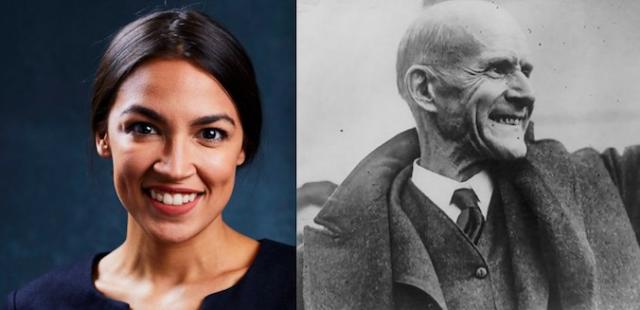Philadelphia -– Last month, a major earthquake shook the bedrock of New York City politics, sending shockwaves that were felt across the US as 28-year-old Bronx-born Puerto Rican socialist Alexandria Ocasio-Cortez trounced Rep. Joe Crowley, a 10-term House of Representatives member who was widely presumed to be the likely successor to long time House leader Nancy Pelosi.
A socialist winning an important House race in a country that just elected billionaire capitalist Donald Trump as president, and handed control of both houses of Congress to the Republicans – a party dedicated to unfettered capitalism? How can this be?
 Socialist candidates in the US: Anastasia Osario-Cortez (2018) and Eugene Debs (1932)
Socialist candidates in the US: Anastasia Osario-Cortez (2018) and Eugene Debs (1932)
Clearly, some kind of tectonic shift is underway in American politics, because Ocasio-Cortez is not the only socialist winning elections and ousting establishment Democrats. Four incumbent members of the state legislature in Pennsylvania, a state that narrowly voted for Trump in 2016, were defeated this year in primaries by insurgent candidates – all of them, like Osario-Cortez, members of Democratic Socialists of America, a little-known political group that has suddenly grown in membership from 6000 prior to 2016 to over 40,000 this year.
And as if that weren’t enough, in a stunning aftershock following her initial win in a Bronx/Queens district, Ocasio-Cortez learned that she had won another primary in a neighboring district in the Bronx on the Reform Party line. That minor party had no candidates running and had urged voters in the district to write in Osario-Cortez’s name, which they did in large numbers. (Of course she could not actually compete in that district as she doesn’t live in it, but her winning by write in with no campaigning, just based upon the knowledge of her political positions is still significant.)
Socialism as a political force has never had an easy time in the US, a country that mythologizes the go-it-alone entrepreneur and the iconoclastic loner. For a brief time in the period between the two world wars, socialism was popular enough among US workers that American Socialist Party leader Eugene Debs was able to win almost a million votes for president in 1912 (about 6 percent of the popular vote at that time). But after two brutal government anti-red campaigns in the ‘20s and ‘50s that included Debs’ arrest, the blacklisting of many actors, teachers and journalists in the 1950s on charges of being Communists, and finally decades of government and media propaganda equating socialism with Communism, Bolshevism and Maoism, socialism has had few adherents and little public acceptance among most Americans.
Until now, that is…
For the rest of this article, which appeared today as an op-ed on the RT-TV website, please go to: Rt.com
